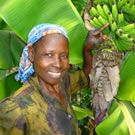Martha Njoroge has been one of CSDi’s best students over the past year. I learned yesterday that her one-year-old baby Brian is seriously ill.
 |
He just spent two weeks in the hospital with pneumonia—and although at first he appeared to be responding well to medications he has recently developed complications: very high fever, chest congestion, is coughing terribly and vomiting and experiencing diarrhea. Martha is being referred to a specialist tomorrow—but is having trouble covering medical expenses. |
 |
Let me tell you a little bit about Martha. Martha lives in Kangema, Kenya, a small rural town of 4,000 about 70 miles north of Nairobi. Over the past 9 or 10 months Martha has partnered with Kathy Tate-Bradish (Illinois in the US—but with a working relationship in Kenya) and Genevieve Lamond (University of Bangor UK but also with a working relationship in Kenya). |
-HIV/AIDS and Sexual Health Education Program
-Advocacy Program with Guardians and Health Care Providers
-Family Garden and Nutrition Program
-Farmer Soil and Water Conservation and Management Program (addressing climate change challenges)
Theirs is a real project and you can read about them in several of my blog posts:
http://www.csd-i.org/csdi-blog/2011/10/25/population-bomb-how-do-we-get-more-development-practitioners.html
http://www.csd-i.org/csdi-blog/2011/10/31/development-in-real-time-3-disease-related-deaths-in-2-weeks.html
http://www.csd-i.org/csdi-blog/2011/11/2/last-call-fall-academy-tragedies-hivaids-malaria-family-plan.html
http://www.csd-i.org/csdi-blog/2012/4/13/family-gardens-for-food-security-and-nutrition.html
 |
Can you please help?
Because of her baby’s increasing health challenges, Martha needs ready cash now to pay for doctor bills and for medications. Any amount that you can donate will help. Even $10 will help. Martha will receive 100% of your donation–CSDi is simply acting as a conduit for funds. Please help—and help quickly. |
Donate to Martha and Brian: http://www.csd-i.org/donate/
To see the quality of Martha’s work and why I’m launching this appeal, view Martha’s recent field reports complete with lots of excellent photos of her community members and project activities. Get a real vantage of her field project:
A1 341: Participatory needs assessment.
A3 303: Nutrition survey and nutritious meal.
A8 303: Garden bed planting.
A1 304: Garden progress/growth of produce.
A4 304: Demonstration Gardens.
A4 343: Assessing Community Vulnerability.
A5 343: Results of assessment.
Thank you in advance for whatever you can donate.
Sincerely,
Tim Magee
Executive Director

